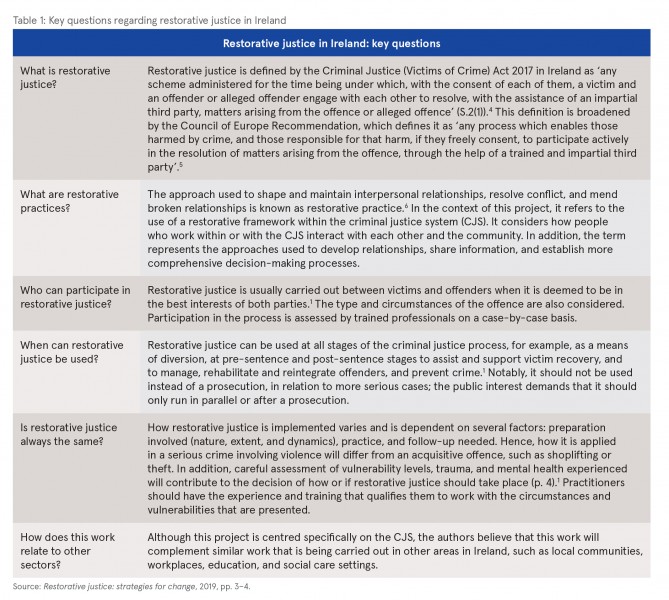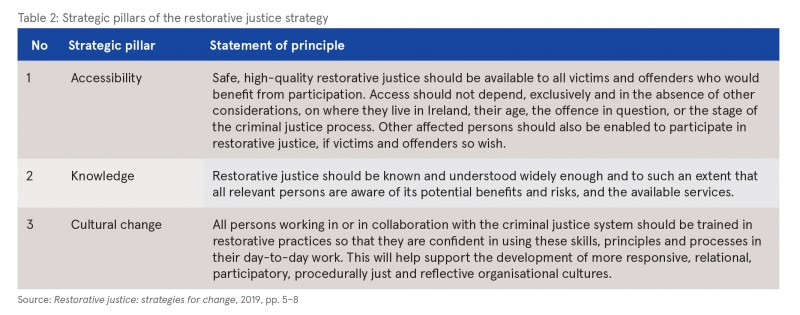Guiney, Ciara (2019) Restorative justice – strategies for change. Drugnet Ireland, Issue 71, Autumn 2019, pp. 23-24.
| Preview | Title | Contact |
|---|---|---|
|
PDF (Drugnet 71)
1MB |
In June 2019, the collective restorative justice strategy for Ireland was published.1 The strategy is the first Irish output of a four-year, collaborative cross-European project aimed at helping to embed restorative justice and restorative practices within the Irish criminal justice system.
So, what is restorative justice? The concept has been achieving increased support within criminal justice jurisdictions in many countries for several years. Notably, in Ireland, the idea first emerged in the 1970s, while the practice has been in operation on a statutory basis under the Children Acts 2001–2015 and, more recently, under the Criminal Justice (Victims of Crime) Act 2017.2,3,4 Table 1 presents a summary of key questions that arise regarding restorative justice in Ireland.1


Strategy background
The idea for the strategy arose from discussions between restorative justice scholars, policymakers, and practitioners attending the 10th International Conference of the European Forum for Restorative Justice (EFRJ) in Tirana, Albania in June 2018.1 Dr Ian Marder, Gert Jan Slump of Restorative Justice Nederland and representatives of the EFRJ, Tim Chapman, Dr Bart Claes and Edit Tӧrz, agreed to act as project partners. The agreed purpose for the project was to:
- Contribute towards refocusing European criminal justice systems, agencies, policies, and practices around restorative principles and processes
- Determine how the Council of Europe Recommendation CM/Rec(2018)8 concerning restorative justice in criminal matters could be used to support this work.
To achieve these aims, four core members were appointed in Ireland and nine other participating European jurisdictions: Albania, Belgium, Czechia, Estonia, Italy, the Netherlands, Poland, Portugal and Scotland. Core members in each area mainly come from academia, justice departments, criminal justice agencies, and non-governmental organisations (NGOs). Ireland’s core members are Dr Ian Marder (Maynooth University); Ursula Fernée (Restorative Justice and Victim Services Unit, Probation Service); Tim Chapman (Ulster University); and Dr Kieran O’Dwyer (Kennedy Institute Peacebuilding Group). Core members have been in place since January 2019 and the project is expected to last four years.
Strategic pillars
The collective strategy for Ireland is centred on information collected from attendees at the Restorative Justice: Strategies for Change Symposium (n=94) at Maynooth University in March 2019.1 People and stakeholders who were unable to attend were also given an opportunity to contribute information by email. Three strategic pillars for the strategy were identified and formed the basis of the final report (see Table 2). An outline of the main objectives and potential actions for each pillar is presented in the strategy.1
Steps to implementation
On 4 June 2019, the authors began the process of disseminating the strategy. They requested that all those on the Stakeholder Group (or who otherwise have an interest in, or responsibility for, the development and use of restorative justice in the Irish CJS) assist them in doing so by publishing the strategy on their organisational websites, mentioning it in their newsletters, and circulating and discussing it widely among colleagues.
They are currently designing the process by which, in collaboration with the Stakeholder Group and with other stakeholders, they will devise and implement specific actions that contribute to achieving the objectives outlined under each strategic pillar. If anyone would like to join the Stakeholder Group, please email Dr Ian Marder (ian.marder@mu.ie) with your name, role and organisation.1
1 Marder I, Fernée U, Chapman T and O’Dwyer K (2019) Restorative justice: strategies for change – a collective strategy for Ireland, 2019–2023: research report. Maynooth: Maynooth University. https://www.drugsandalcohol.ie/30686/
2 National Commission on Restorative Justice (2008) National Commission on Restorative Justice: Interim report. Dublin: National Commission on Restorative Justice. Available online at: http://www.justice.ie/en/JELR/RestorativeJustive%20LR.pdf/Files/RestorativeJustive%20LR.pdf
3 National Commission on Restorative Justice (2009) National Commission on Restorative Justice: Final report. Dublin: National Commission on Restorative Justice. Available online at: http://www.justice.ie/en/JELR/NCRJ%20Final%20Report.pdf/Files/NCRJ%20Final%20Report.pdf
4 Criminal Justice (Victims of Crime) Act 2017. Available online at: http://www.irishstatutebook.ie/eli/2017/act/28/enacted/en/html
5 Council of Europe (2018) Recommendation CM/Rec(2018)8 of the Committee of Ministers to member states concerning restorative justice in criminal matters. Strasbourg: Council of Europe. Available online at: https://search.coe.int/cm/Pages/result_details.aspx?ObjectId=09000016808e35f3
6 O’Dwyer K (2014) Towards excellence in restorative practice: a quality assurance framework for organisations and practitioners. Dublin: Restorative Practices Strategic Forum. Available online at https://www.cdi.ie/wp-content/uploads/2016/11/RPSF_QA_Framework_FINAL.pdf
MM-MO Crime and law > Criminal penalty / sentence > Community service > Probation or parole
MM-MO Crime and law > Justice and enforcement system
T Demographic characteristics > Person who commits a criminal offence (offender)
VA Geographic area > Europe > Ireland
Repository Staff Only: item control page